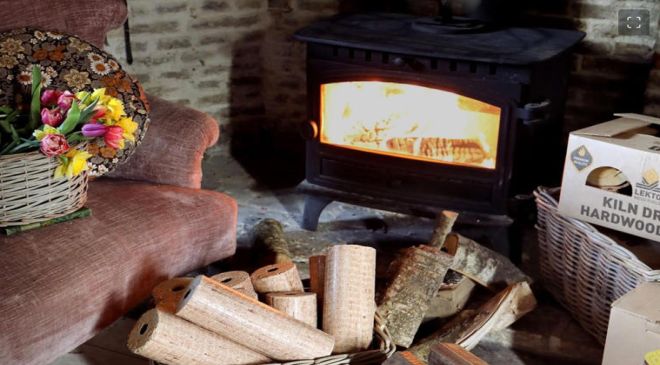Biomass briquettes are by no means a new invention. The first commercial briquetting machine was made back in 1865. It was used to turn dried peat into a source of fuel. Today, similar machines can be used to turn hundreds of different organic materials into eco-friendly briquettes. Popular options today include recycled sawdust, bark, rice husks, straw, ground nut shells, and even municipal waste.
This can be a great opportunity for eco-friendly businesses. With air quality becoming an increased concern in India, The Commission for Air Quality Management (CAQM) has encouraged the use of biomass briquettes as an eco-friendly alternative to coal. Amongst other things, briquettes have been proposed as a preferred alternative to coal for religious purposes, cremation, tandoors, grills, open eateries, and dhabas.
Read More:-How Each Zodiac Sign Feels About Being Friends With Benefits
To learn more about modern wood fuel briquettes, we’ve teamed up with Artūrs Kasjanovs from Lekto Woodfuels. Established in the UK in 2016, Lekto was one of the first UK suppliers of biomass briquettes to apply modern e-commerce tactics to the then-stagnant wood fuel industry. This allowed it to quickly become a market leader.
Read on to learn about the 5 environmental benefits of biomass briquettes
Benefit #1: Wood Briquettes Help Prevent Deforestation
According to Lekto experts, wood briquettes are not only a great alternative to coal, but they are also much more eco-friendly than regular firewood. Briquettes are more energy dense and are typically drier than firewood, which helps them burn more cleanly and efficiently. But that’s not even the most important part.
Read More:-Mom Gets Called Down To Daughter’s School About The ‘Bowtie’ The 11-Year-Old Drew On Her Art Project
Unlike firewood production, which can be linked to deforestation, no trees need to be cut to create wood briquettes. This is because wood briquettes aren’t made of firewood. Instead, they are typically manufactured from materials discarded during the sawmilling process.
Sourcing this scrap material is a lot less expensive than creating sawdust or wood wool from firewood. This means that businesses have a direct profit incentive to go the more eco-friendly route of recycling wood waste.
Benefit #2: Briquettes Can Help Reduce Landfill Waste
Sawmill byproducts aren’t the only type of material briquettes can be made from. Here are just some alternative waste materials that can be recycled into fuel briquettes:
Tea Waste. Being the world’s second-largest producer of tea, India generates massive quantities of tea waste. A lot of this waste can be turned into biochar and then compacted into briquettes with a calorific value of 22-24 MJ/kg,
Sugarcane Waste. With the sugar sector playing an important role in India’s economy, there is no shortage of sugarcane waste, which can also be turned into cheap, clean, eco-friendly energy.
Rice Husks. The burning of rice husks is a serious environmental concern in many parts of the country. So much so that, Punjab authorities have greenlit the construction of a biofuel manufacturing plant back in 2019. The creation of biomass briquettes is yet another way to recycle these rice husks.
Wheat Straw. The same goes for wheat straw. While some of the straw generated from wheat production can be made into animal feed and bedding, the surplus is often burned. This is a missed opportunity because straw can be turned into high-quality briquettes that are approximately 33% more energy-dense than rice husk briquettes.
Municipal Waste. Every year, India generates 62 million tons of municipal solid waste. Instead of going to the landfill, a large portion of this waste can be converted into biomass briquettes. Kitchen waste, in particular, is a perfect candidate for briquetting as nearly all of it can be ground up and compacted into briquettes.
Benefit #3: Briquette Production Creates Jobs in Rural Areas
The creation of jobs in the sustainable energy sector is another benefit. The creation of biomass briquettes is typically carried out by small-scale manufacturers that are located close to the source of waste material used for briquetting. This can help create much-needed year-round jobs for people in rural areas.
How many jobs are we talking about? A wide variety. The raw material must first be gathered and transported to the manufacturing facility. Then, someone needs to maintain and operate the pressing rod that creates the briquette itself. The briquettes then need to be packaged to be sent out to wholesale suppliers, creating further job opportunities down the line.
As each briquetting facility can only process a limited amount of raw matter, there can be several of these facilities near major sources of raw waste material. This further multiplies the number of jobs created.
Read More:-U.S. stocks mostly end lower, S&P 500 extends losses as investors weigh quarterly earnings
Benefit #4: Biomass Briquettes Can Improve Air Quality
Most people know that coal is a major contributor to air pollution. But fewer people know that poorly dried firewood is also a major contributor to India’s air quality problems.
When poorly dried wood is burned, it releases a multitude of harmful compounds into the air, many of which are toxic and cancerogenic. These compounds are created when the moisture contained in the firewood logs interacts with the fire, creating smoke.
The lower the moisture of your biomass fuel, the less it will smoke. As a result, less pollution will be created.
Freshly cut logs contain 50-70% moisture and will smoke a lot when burned. Properly dried firewood needs to contain less than 20% moisture. This level is considered safe for your health and the health of the environment. And briquettes typically contain less than 9% moisture, which makes them one of the cleanest types of biomass fuel.
Benefit #5: Biomass Briquettes Reduce Dependence on Fossil Fuels
Like any other heat-producing fuel, biomass briquettes can be used to generate electricity in thermal power stations.
When used instead of coal and gas in small power stations, biomass briquettes can help reduce the price of electricity in rural areas. It can also help reduce our dependence on fossil fuels and reduce energy-generation-related emissions.
With solar and wind-powered electricity still being prohibitively expensive, biomass briquettes can become the first step towards more sustainable, eco-friendly electricity generation.









































